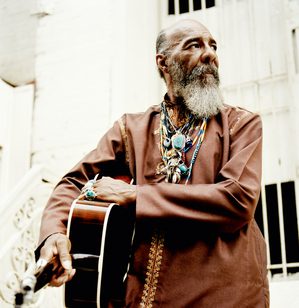Richie Havens recalls Woodstock, keeps the message alive
For Richie Havens, it all comes back to Woodstock.
“I found myself with no songs to sing at the end of the show. … My knees were knocking. It was the first time I had seen so many people … I discovered who I was in the process,” he recalled.
He is talking, of course, about his near-legendary, nearly 3-hour performance as the opening act of the generation-defining musical event in upstate New York in August, 1969. As the festival’s first act, he was told to play an extra-long set because other artists were unable to reach the festival location. Finally, out of tunes, he improvised a number based on the spiritual “Motherless Child” that became his signature song, “Freedom.”

Folk music icon Richie Havens performs at the Ann Arbor Folk Festival on Saturday.
Jean-Marc Lubrano
“I am fortunate enough to be able to sing the songs I sang then on the stage now. … It keeps us alive and it keeps the message alive,” he told AnnArbor.com during a recent phone conversation.
Havens, part of the Greenwich Village folk scene of the early 1960s who is known for his intensely rhythmic guitar style as well as his soulful covers of pop and folk songs, remembers Woodstock as if it were yesterday.
“When I went out on the ride with the Woodstock situation, I got out of the taxi, pulled my guitar out, went up to the building … They’ve got a big thing where you put all the names up; there was my lonely name, Richie Havens, folk/blues singer. I’m not a blues person … (I wondered) what the hell do I do now?”
What he did was play … and play, and play. And the rest is history.
Richie Havens performing “Freedom” last fall:
“That’s where I got my foundation of feeling safe,” he said.
“It’s interesting, (some of the) young people (at Woodstock) were more interested in seeing how I was doing what I was doing — the guitar for instance and how I played that. For me to go and play there, it changed me, right there in that opening, along with everyone else.”
He laughs when asked if Woodstock was the start of his career.
“People had seen me at two festivals prior — sometimes people think I was born (at Woodstock), but I was actually born at the Newport Folk Festival,” Havens explained.
Although he accepts his iconic status, Havens isn’t particularly impressed by it.
“Well, it doesn’t bother me, but it’s not important to me either,” he said.
Havens has been busy since the Woodstock days. He’s released a number of albums since then, with a few chart hits, such as 1971’s “Here Comes the Sun.” He also explored acting, and was cast in the original 1972 stage presentation of The Who’s “Tommy.” He is a staunch supporter of ecological issues and, in the mid-1970s, co-founded the Northwind Undersea Institute, an oceanographic children’s museum on City Island in the Bronx.
Listen to a selection of songs by Richie Havens:
Havens performed at the inauguration of President Bill Clinton in 1993 and, in 2000, published “They Can’t Hide Us Anymore,” an autobiography co-written with Steve Davidowitz. He released a new studio album, “Nobody Left To Crown,” in 2008, and is currently working on another.
PREVIEW |
Havens has also participated in various concerts and events commemorating that watershed moment in music. He recorded a new version of “Freedom” for the soundtrack of the 2009 movie “Taking Woodstock” and said he’s impressed at how well the movie captured the spirit of the event.
“I can tell you that the new movie that they made was just about one inch off the notch,” he observed. “The beauty of it was it brought an event alive. Everything that happens in the movie was pretty much walking inside … Woodstock. It blew my mind. I expected almost nothing — it was like those things (where) you put the iron down on the t-shirt, you lift it up and there it is.”
Guitarist Walter Parks will join Havens for the Ann Arbor appearance, which comes just a few days after Havens’ 69th birthday. And although Havens knows how he’ll start and end the set, he’s not so sure about what will come in between.
“I know the first and last — Whatever happens in the middle happens,” he said. “I start out with ‘All Along the Watchtower,’ and at the end, if I don’t do ‘Freedom,’ they beat me up outside.”
And will he play for three hours? “Not that I know of,” he laughed.
Roger LeLievre is a freelance writer who covers music for AnnArbor.com.

